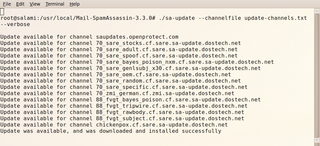
By Charly Kühnast
About a year ago, I wrote about SpamAssassin's own update function, SA-Update [1]. It keeps the rules that SpamAssassin [2] includes up to date and can integrate and update rules from third-party sources.
The detection rate my spam filters achieve depends to a great extent on these sources. I currently use the sources in Listing 1; line 1 provides the default ruleset.
The development team has just taken the next logical step and now provides SpamAssassin 3.3.0 without a standard ruleset. After completing the installation, you have to call sa-update. Alternatively, the distribution makers provide the rules themselves as a continually updated package. Or, you can create a cron job for sa-update. This forces those SpamAssassin users who are too lazy to update to protect themselves with the current ruleset.
| Listing 1: Additional Sources |
01 updates.spamassassin.org 02 saupdates.openprotect.com 03 70_sare_stocks.cf.sare.sa-update.dostech.net 04 70_sare_adult.cf.sare.sa-update.dostech.net 05 70_sare_spoof.cf.sare.sa-update.dostech.net 06 70_sare_bayes_poison_nxm.cf.sare.sa-update.dostech.net 07 70_sare_genlsubj_x30.cf.sare.sa-update.dostech.net 08 70_sare_oem.cf.sare.sa-update.dostech.net 09 70_sare_random.cf.sare.sa-update.dostech.net 10 70_sare_specific.cf.sare.sa-update.dostech.net 11 70_zmi_german.cf.zmi.sa-update.dostech.net 12 88_FVGT_Bayes_Poison.cf.sare.sa-update.dostech.net 13 88_FVGT_Tripwire.cf.sare.sa-update.dostech.net 14 88_FVGT_rawbody.cf.sare.sa-update.dostech.net 15 88_FVGT_subject.cf.sare.sa-update.dostech.net 16 chickenpox.cf.sare.sa-update.dostech.net |
SA-Update itself is fairly conservative; only the --verbose switch is new (see Figure 1). Originally, I considered the replacement of the previous DomainKeys plugin with a new Mail::DKIM in the new 3.3.0 version to be fairly inconsequential, but this is not true. Mail::DKIM supports Author Domain Signing Practices (ADSP). Behind this cryptic moniker lurks a potentially lethal weapon against phishing. DKIM gives you an easy approach to discovering whether the sender of an email message really is the person he claims to be.
But what if an unsigned email message arrives from the same domain? Does this mean it is a fake? Probably not, the sender could be a road warrior, and thus forced to use another, non-DKIM mail gateway. The ADSP DKIM extension makes it possible to store notes on signature behavior, or "Signing Practices" if you prefer, directly in the corresponding DNS record. If you find the key word discardable, this means: Dear Receiver, we sign all outgoing mail. If you received an unsigned message, we would advise you to ditch it.
If ADSP can establish itself with typical phishing-prone senders like banks, or online shopping centers, life is going to become hard for phishers. At last!
| INFO |
|
[1] "New Order" by Charly Kühnast, Linux Magazine, March 2009, pg. 63, http://www.linuxpromagazine.com/Issues/2009/100/NEW-ORDER
[2] SpamAssassin: http://spamassassin.apache.org |